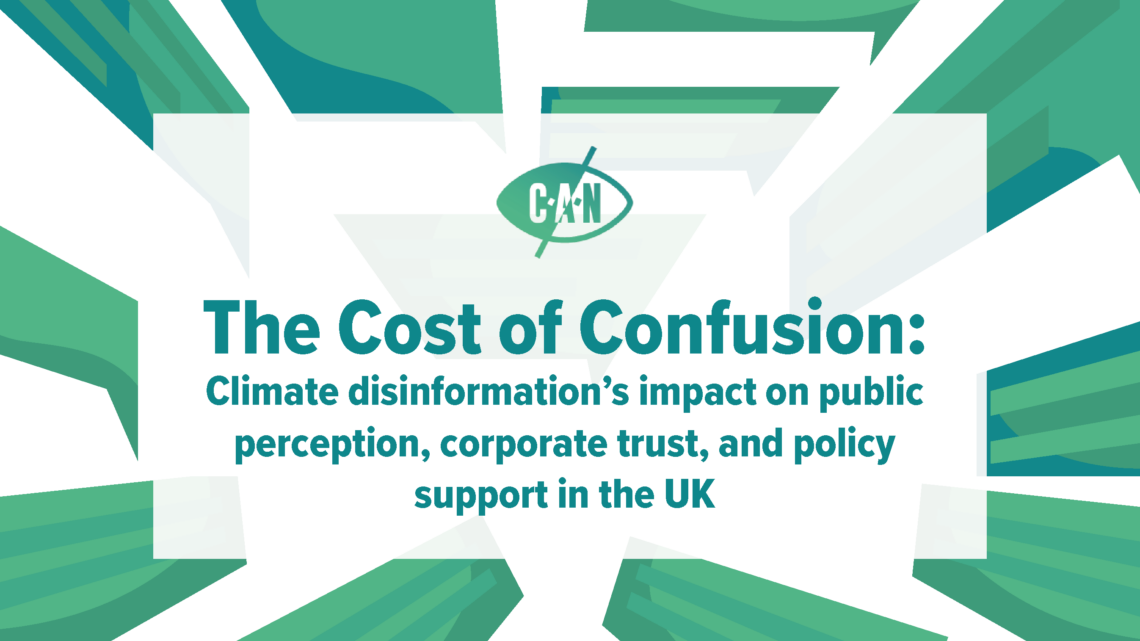-
- Widespread Concern: The majority of Britons believe climate change is affecting the global and UK economies, as well as the cost of living.
-
- Impacts Underestimated: Despite widespread concern, many underestimate the personal impacts of climate change on their own health and quality of life.
-
- Only 9% trust brands all of the time to accurately communicate climate commitments
-
- 85% recognise that humans have impacted climate change, but only half (50%) understand that humans are the main cause of climate change
-
- Social Media’s Role: 40% of respondents identify social media as the primary source of climate disinformation.
Climate disinformation prevalent in the UK
Overall, 82% of the British public believes in at least one of the pieces of disinformation presented in the survey, and the average British person believes in 2.4 of the 7 pieces of information. Men, millennials and those outside England believe in more of the pieces of disinformation on average. Despite this, most (55%) do understand that climate disinformation has contributed to confusion or scepticism about climate change. A full 40% of respondents pointed to social media as the primary source of climate disinformation, followed by news articles (20%) and family and friends (9%).
Concern about impact disconnected from the personal
There is a high level of public concern about the impacts of climate change on various aspects of life. Two thirds (66%) believe climate change affects human health, but only 41% believe it affects their personal health. Further, while 74% believe climate change affects food and water security, only 48% believe it affects their quality of life, emphasising the need to connect global issues to personal experiences.
Impact on brands
With a high concern over impacts on the UK and global standard of living, 45% of consumers would stop supporting a company associated with climate disinformation while only 9% fully trust brands in how they portray their climate commitments. The prevalence of these narratives and mixed understanding of impact poses a risk for British businesses. Ultimately the report highlights the urgent need for targeted interventions which counter climate disinformation and promote accurate information to those susceptible to it.
Jake Dubbins, co-founder, Conscious Advertising Network said:
“This research shows that misconceptions about climate change are widespread, and the advertising and media industries must recognize their role in either perpetuating or addressing these misconceptions.Businesses need to recognise that association with climate disinformation not only undermines their credibility and reputation but also jeopardises their long-term viability in a world increasingly focused on sustainability. By actively distancing themselves from disinformation and ensuring messaging aligns with climate science, companies can contribute to a more informed public discourse, bolster consumer trust, and safeguard their future in a changing economic and environmental landscape.CAN is working with media owners and tech platforms alongside members to implement climate misinformation policies aligned to the Conscious Advertising Network Climate & Sustainability manifesto. This has helped lead to climate misinformation policies developed by Google, Pinterest, Meta and Tik Tok”
Pamela Stathaki, Head of Sustainability for the UK and EMEA at dentsu said:
“This survey shows us that there’s clearly a disconnect between the understanding of the global and personal impact of climate change and we’re hoping our work here can contribute to a greater sense of corporate responsibility. Therefore, when it comes to climate crisis communication – there is a need to create a responsible, evidence-informed dialogue which resonates with people. This demonstrates more than ever the power of industry bodies like CAN to convene key players across the industry including the platforms to both recognise the harms of mis/dis info and uphold standards.”
